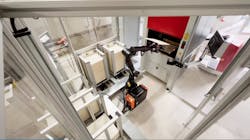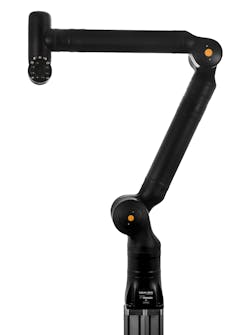Kassow Robots, a designer and manufacturer of lightweight 7-axis cobots for industrial applications, and its partner IBK IngenieurConsult, worked with German biological pesticide company Biocare to create an automated system to package its Trichosafe product. Trichosafe consists of biodegradable capsules containing larvae of a parasitoid wasp whose larvae are spread on fields to eliminate the destructive European corn borer.
At the start of the project, Biocare was a newcomer to the use of cobots. Sebastian Beitzen-Heineke, managing director at Biocare, said he brought in IBK because he wanted outside ideas. Without their input, he said, “I probably never would have ventured into robotics on my own. And I never would have expected it to be affordable.”
The first cobot from Kassow Robots that Biocare implemented loads and unloads a laser system that creates holes in cardboard packaging. The company’s organic pesticide pellets sit inside the holes.
“In the first production stage, holes have to be formed in the cardboard that are then filled with the organisms,” Beitzen-Heineke said. “That used to be done with a needle board, where the balls [capsules for holding the larvae] were pierced with extremely fine needles. But that method was imprecise and resulted in cardboard fibers that could swell with moisture, causing the holes to close up again. IBK designed a complete solution for us consisting of a laser system and a cobot as a helper.”
This first stage of this cobot system is built on Kassow Robots’ KR1205 cobot with a double-gripper head. “A double gripper enables the cardboard to be changed extremely quickly, and it’s immediately ready with the next piece of cardboard,” Beitzen-Heineke said.
The KR1205 uses one gripper to retrieve a piece of untreated cardboard packaging from a stack. As the laser machine opens, the cobot turns and rotates one gripper, allowing the second gripper to remove a piece of treated packaging from the machine. The cobot then retracts slightly and the first gripper rotates to place the untreated piece of packaging into the laser machine. The KR1205 retracts again and turns to place the treated packaging onto a finished pile before starting the process again. The entire sequence takes 18–20 seconds.
“One of us presses the start button every morning,” Beitzen-Heineke said. “The machine and the cobot run autonomously for about four hours without anyone having to stand next to the cobot.”
7-axis cobot flexibility
One feature of the KR1205 cobot that contributes to the overall efficiency of the process is its use of seven axes.
“When we got started, I didn’t know that most cobots on the market only have six axes or what the seventh axis actually makes possible,” Beitzen-Heineke said. The seventh axis allows the KR1205 to reach into deep containers used to hold the cardboard pieces.
In addition to the KR1205 cobot that moves the cardboard to and from the laser machine, Biocare uses three additional KR1205 cobots in the Trichosafe packaging process. For instance, once the wasp larvae are put into capsules, cobots glue more packaging on top of the capsules so the larvae can’t escape.
“The bottom line is: With only half the workers, we now achieve four times the volume along with a quality increase,” said Beitzen-Heineke.
Part of this production and quality boost can be attributed to how easy the cobots are to use. “IBK took over the training of personnel on the cobots once the system was in place,” Beitzen-Heineke said. After minimal training, workers with various levels of robotics experience could easily operate the Kassow Robots’ cobots. “That includes troubleshooting small problems. For example, when the cardboard occasionally gets hung up in the gripper,” he said.
Beitzen-Heineke added that the cobots have also increased job satisfaction among employees. “With the cobot taking over the mindless work, the employees are enjoying new challenges and can also operate the cobot,” he said.
For manufacturers considering use of cobots, Beitzen-Heineke said it’s important to keep an open mind. “Rethinking things, such as with cobots, can mean much more than simply relieving employees (of repetitive tasks). It can also be a very worthwhile investment in terms of product quality. And you become more attractive as an employer with monotonous jobs handled by cobots, allowing the team to focus on monitoring and other more interesting tasks.”
Christian Torp is technical director and cobot expert at IBK IngenieurConsult GmbH.



